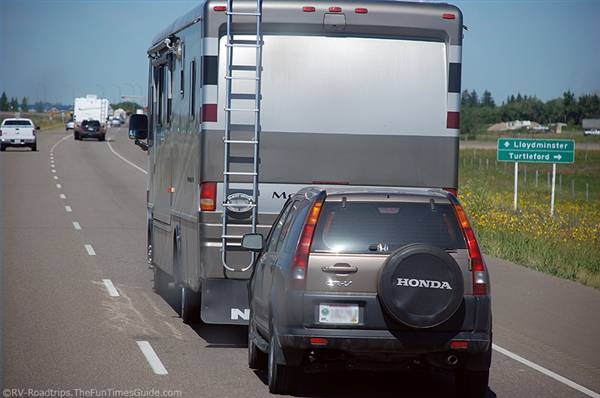
Sometimes you are put into a situation where you want to tow your car. Maybe you are moving out of state and need to transport the car behind the moving truck, or maybe you are going on vacation and would like to tow the car trailer behind your camper. Even if you are just moving the car to the shop and are towing it behind a pickup truck, there are a few precautions you should know so you don't end up on the side of the road with a burned-out transmission or, worse yet, looking up into the sky from your front window.
Check to see how much the tow vehicle can carry. Usually this is available on the manufacturer's website. You have to consider not just the weight when you are pulling a car trailer, but also the brakes and suspension of the tow vehicle. One of the trademark rules of towing is that the trailer and load must not weigh more than 75 percent of the tow vehicle. Always use a vehicle that can carry more than what you have rather than just enough. (See Resources for full specifications on weight.)
Inspect the tow hitch on the tow vehicle and the trailer. It must be securely mounted and rated to pull the load of the car trailer. It should be approximately level with the trailer when the trailer is sitting level. The ball should be lightly lubricated for easy movement during driving. Inspect for rust and change the hitch if there is anything significant. You must have safety chains as a backup in case the hitch comes apart, but they should not be dragging.
Use a tire gauge to check the tire pressure of all of the tires, both for the trailer and for the tow vehicle. Fill them up to the optimum pressure. Car trailers will have four tires to distribute the weight evenly, and each of them should be in good condition.
Go to a mechanic and have the brakes inspected, especially on the tow vehicle. If the pads have worn down, the extra weight of the towed car and trailer might be enough to ruin your brakes or cause them to fail during braking on the road. The trailer might be required to have breakaway brakes, depending on your state regulations.
Make sure the trailer is wired correctly. You will need to have working lights for brakes, turn signals, backing up and parking. Depending on the weight of the trailer, you may also have to have electric brakes that are controlled from the driver's seat. All of these are normally wired through a connector at the back of the tow vehicle.
Check all the legalities. These include trailer inspection and registration, tagging, if your insurance carrier will cover the towed car, how high and wide your trailer is, the combined weight of the towed car, trailer and towing vehicle, and whether or not you are required to have larger side and rearview mirrors. A call to your local highways administration office could save you a lot of grief.
Drive slowly and cautiously. Some states may require a special driver license for towing. Usually the speed limit is the same for towing, but in some states, it is lower. Start slow at intersections and brake early. Give yourself time to get the feel for driving with the trailer before heading into city traffic.